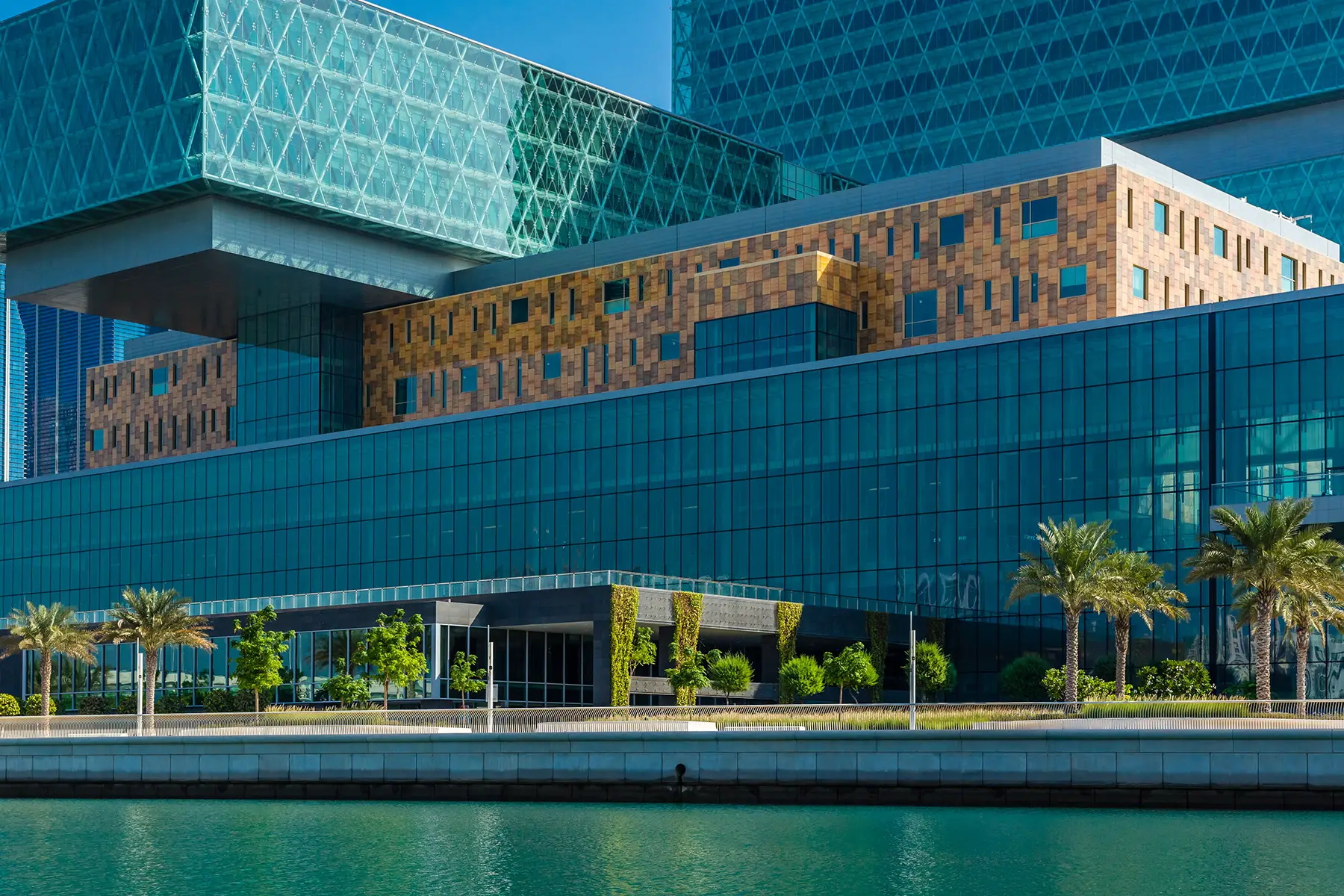The UAE has a solid healthcare system that combines public and private coverage, but who gets access depends on your nationality and visa type. Emirati citizens are covered by government-backed programs like Thiqa and Enaya, while most foreigners – especially non-GCC residents – need to take out private health insurance.
Since coverage is mandatory for nearly everyone, it’s important to understand how the system works before you book a doctor’s visit (or even before you apply for a visa).
Here’s what you need to know:
APRIL International
Looking for expat-friendly health insurance in the UAE? APRIL International has a long history of providing health coverage tailored to the unique needs of the expat lifestyle, ensuring peace of mind for you and your family. Whether you’re relocating to the UAE or simply staying short-term, APRIL International has the right policy for you.
Health insurance in the Emirati healthcare system
The UAE has a universal healthcare system that can be accessed through both public and private coverage.
Public health insurance covers most essential treatments, including doctor visits and hospital care. Unfortunately, though, the public system is not available to expats from outside the Gulf Cooperation Council (GCC – Bahrain, Kuwait, Oman, Qatar, and Saudi Arabia). Instead, these foreign nationals must take out private health insurance (التأمين الطبي).

The Ministry of Health and Prevention (MoHaP – وزارة الصحة ووقاية المجتمع) regulates public health in the UAE and sets the country’s national health strategies. On a regional scale, the Abu Dhabi Department of Health (DoH – دائرة الصحة), Dubai Health Authority (DHA – هيئة الصحة بدبي), and Sharjah Health Authority (SHA – هيئة الشارقة الصحية) oversee public and private healthcare in their respective emirates.
Meanwhile, the Central Bank of the UAE (CBUAE – مصرف الإمارات العربية المتحدة المركزي) monitors private health insurance companies in the UAE. In Dubai, there are also the Dubai Health Insurance Corporation and the Dubai Financial Services Authority (DFSA) that act as local regulators.
Who needs health insurance in the UAE?
Health insurance is mandatory in the UAE. It doesn’t matter if you’re a tourist on a beach holiday or an Emirati citizen with family roots that go back centuries: if you stay in the country, you must have medical insurance.

Manager, APRIL International
Anthony Salviac
Insider Tip: Setting up in Dubai?
Don’t forget that access to healthcare often starts with paperwork. Some clinics require proof of local insurance or Emirates ID before your first visit.
Save time by choosing an international health plan accepted locally, and make sure all your documents are ready before you need them. Smooth admin = better care.
For locals, this means signing up for public health insurance. Expats from outside the GCC, on the other hand, will need private coverage. Before we dive into the nitty-gritty, here’s a quick overview of who* needs what:
| What’s your status? | Do you need private health insurance? |
| Employees | Only if you want 100% coverage |
| Golden Visa holders | Yes |
| Job seekers | Yes |
| Students | Yes |
| Pensioners | Yes |
| Asylum seekers and refugees | It depends on your individual situation |
Salaried workers and freelancers
UAE employers are legally required to supply basic health insurance to foreign employees, including domestic workers. In most cases, one wife and up to three children under 18 years old. Expat freelancers must arrange for private insurance on their own accord.

It’s worth noting, however, that basic UAE health insurance doesn’t cover all treatments (e.g., childbirth is excluded) and typically has a six-month coverage gap. This means your employer pays the insurance fees, but you won’t be covered until six months after registration.
To avoid any large out-of-pocket payments, you may want to look into getting private (top-up) insurance.
Cigna Global
Enjoy peace of mind while living in the UAE with Cigna Global’s long-term international health insurance plans (12+ months). Get tailored coverage, direct billing with many providers, complex case management, and global care on demand, with access to a network of 1.5+ million doctors, specialists, and therapists.
Golden Visa holders
If you live in the UAE on a Golden Visa, you and your relatives must take out private health insurance for the duration of your permit. Investors, entrepreneurs, and real estate owners will need to purchase their own insurance, while outstanding specialized talent may be covered by their employers.
(Unemployed) job seekers with or without an income
Foreign job seekers who come to the UAE to look for work have a couple of options for health insurance:
- Expats from the GCC can access public healthcare using their own country’s health benefits
- Expats from elsewhere must purchase private health insurance as part of their visa application
If you are a (established) resident of Dubai, you may qualify for the Essential Benefits Plan (EBP). This health insurance option is primarily designed to help low-income households, earning less than AED 4,000 per month.
Health insurance for children and students
Emirati children have access to free healthcare, while expat children are automatically covered by their parents’ or guardians’ health insurance. Kids can usually remain insured as dependents until they turn 26, although some insurers may allow coverage past that age if they are full-time students or have special needs.

International students can either:
- Access public healthcare if they are from the GCC
- Take out private health insurance if they are from elsewhere
Health insurance for retired pensioners
Retired seniors must have private health insurance to cover their medical expenses. If you have family in the UAE, they may be able to sponsor you, which would give you access to public health insurance.
Short-term visitors and tourists
Tourists visiting the UAE from a visa-exempt nation don’t need health insurance to enter the country. However, it’s a good idea to have travel health insurance, just in case. Emirati medical care is high-quality, but can be expensive if you have to pay for it yourself.
If you need a visa to enter the UAE, you must take out private health insurance as part of the application process.
Asylum seekers and refugees
The UAE has not signed the 1951 UN Refugee Convention and does not officially recognize or register refugees. So, any person seeking asylum in the country is typically subject to general immigration laws. In other words, they are expats who must have a visa and private health insurance.
Of course, when you’re fleeing a situation in your home country, applying for a visa is the last thing on your mind. As a result, refugees are often undocumented and likely unable to get proper coverage.
That said, emergency medical care is generally accessible to all people in the UAE, including undocumented asylum seekers. Routine healthcare may be available through humanitarian assistance, non-governmental organizations, or out-of-pocket payments.
How does public health insurance work in the UAE?
Public health insurance works differently in Abu Dhabi and Dubai than in other emirates.
In Abu Dhabi and Dubai, UAE citizens and GCC nationals must register for Thiqa or Enaya (respectively) to access public healthcare. In other emirates, patients just have to prove their nationality, and all is sorted. In other words, they can typically get medical help by just showing up.

Can foreigners get public health insurance in the UAE?
Yes and no. GCC citizens can access public insurance; those from elsewhere cannot.
What does public health insurance cover in the UAE?
The Emirati public health system is quite comprehensive and covers a range of essential services, including doctor visits, vaccinations, prescription medication, and hospital and emergency care.
Services and treatments that are typically excluded or not fully covered include certain dental procedures, mental healthcare, vision and hearing care, alternative medicine, long-term rehabilitation and elderly care, and medical help abroad.
Overview of private health insurance in the UAE
While private health insurance is mandatory for most foreigners in the UAE, having this residency requirement isn’t all that bad. Private health facilities often have shorter waiting times, more specialized treatments, and higher levels of comfort and luxury.
The country has many insurers that cater to students, working parents, pensioners, and others, as well as internationals with global coverage and special English- or other foreign language services.

Advantages of private health insurance in the UAE
Since private health insurance is mandatory for most foreign residents, the biggest advantage is that you get to stay in the UAE. But all joking aside, anyone, regardless of their nationality, can benefit from a private insurance plan.
The biggest advantages include:
- No copayments or coverage gap
- Access to English-speaking health professionals
- Additional coverage for non-essential treatment (e.g., dental care)
- Wider range of healthcare providers who offer personalized care
- Premium levels of luxury and comfort (i.e., private rooms) in hospitals
- Faster access to better and more efficient medical care
- Sickness and funeral benefits
- Coverage abroad
Orient Insurance
Orient Insurance provides a range of insurance products, including medical coverage, for internationals in the UAE. With over 40 years of experience in the country’s insurance market, they offer policies for your health, vehicle, home, and much more. When moving to the UAE, trust Orient Insurance to protect what matters.
How to apply for private health insurance in the UAE
With the number of health insurance options in the UAE, it makes sense to look around and compare plans. Aside from the affordability, things you could consider include:
| Consideration | Questions to ask |
| Does the policy suit your needs | Are you able to select what you need and remove what you don’t? |
| Payment process | Will your insurer settle bills directly, or do you have to pay first and then claim reimbursement? How complicated and/or time-consuming is the process? |
| Special offers and incentives | Can you get a discount on your premium by signing up for a certain plan? Does the insurer offer reward programs? |
| Overseas coverage | Is travel insurance offered, and do you need it? |
| Customer feedback | How does the company score on consumer ratings websites? |
| Cancellation policy | How easy is it to change to another provider? Will you have to pay to cancel? |
Be sure to ask your employer about their health policy as well; you may be able to sign up with a company discount.
Once you’ve decided on a plan, you can contact the insurance company directly to sign up. They will be more than happy to walk you through the process. Beware of pushy salespeople, though! You might walk away with a completely different policy than you had in mind.

How to get money back from health insurance
Private insurance policies in the UAE vary substantially in price. This means that some of the more affordable ones might not be accepted at the larger, more popular, or reputable hospitals and clinics. Always check with your insurance provider to see what’s covered before booking an appointment.
If your insurer has contracted the health service, they may settle the medical bill directly, without you having to pay first. In other cases, however, you may need to pay the bill upfront and ask for reimbursement afterward.
Double-check with the insurance company to see what their reimbursement policy is. Most allow you to scan or take a photo of the bill and upload it online. Others require you to send in the original invoice on paper.
Private and international health insurance providers
In addition to private Emirati insurers, there are also international insurance companies that cater specifically to expats. These providers are ideal for UAE residents who want to avoid the coverage gap, who travel outside the country a lot, or who prefer expat-focused care:
APRIL International provides health insurance solutions for expats and globally mobile individuals in over 180 countries. Their plans are highly flexible, allowing customers to tailor coverage and pricing to their needs. Policyholders can also choose various deductible options to suit their budget and lifestyle.
The Munich-headquartered financial services company offers international health insurance plans for expat students, professionals, couples and families. Depending on the policy, Orient Insurance covers everyday medical expenses, emergency treatment, dental consultations, maternity, surgery, and outpatient fees.
How much does Emirati health insurance cost?
Is public health insurance in the UAE free?
Yes, public health insurance is free for UAE nationals and non-UAE family members.

How much is private health insurance in the UAE?
When it comes to private health insurance, most insurers in the UAE have different policy levels, ranging from basic to comprehensive. Premiums usually depend on:
- Extra coverage (e.g., dental care or hospitalization)
- Coverage location (i.e., whether the policy covers abroad)
- Personal information, such as age and health conditions
Depending on the extra coverage, you can expect to pay around AED 500–1,500 a year for basic insurance plans. Mid-range plans cost between AED 3,000 and AED 7,500 per year, whereas more comprehensive plans will set you back around AED 10,000–20,000 per year.
Again, it’s always smart to research and compare insurance policies to get the best healthcare coverage.
Useful resources
- Ministry of Health and Prevention – official government website of the ministry responsible for the national healthcare regulations in the UAE
- Department of Health – official government website of the Abu Dhabi health authority
- Doha Health Authority – official government website of the Dubai health ministry
- Emirati Health Service – official government portal with information and ways to contact public healthcare professionals
- U.AE – official government website with information on healthcare in the UAE











